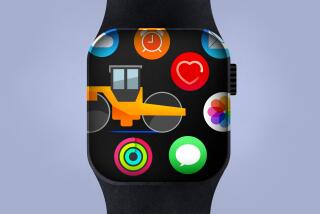Apple Exec Stands By Sabotage Accusation
- Share via
WASHINGTON — An Apple Computer Inc. executive questioned by a Microsoft Corp. lawyer Wednesday stuck by his accusation that the software giant had “sabotaged” Apple’s multimedia software.
The lawyer for Microsoft, Theodore Edelman, challenged the 45-page written testimony of Apple software executive Avadis Tevanian during cross-examination in U.S. District Court.
The Justice Department and 20 states have alleged that Microsoft violated the nation’s antitrust laws by competing unfairly against Netscape Communications Corp. in the market for Internet browsers.
Tevanian was called by the government to testify about the methods Microsoft used to persuade Apple in 1997 to switch from the Netscape browser to Microsoft’s Internet Explorer.
At one point during the trial, Microsoft asked to demonstrate for the record how easily Apple computer users could switch back to the Netscape Navigator browser.
But the demonstration seemed to leave District Judge Thomas Penfield Jackson with the opposite impression after he allowed Tevanian to provide accompanying commentary.
“With that explanation I’ll admit it, but it certainly doesn’t tell me how to do it,” Jackson said.
Tevanian, Apple’s senior vice president for software engineering, said Microsoft had set a condition for its continued support for a version of Microsoft Office that would run on Apple computers: Apple must agree to feature Microsoft’s Internet Explorer over Netscape Navigator.
Tevanian also testified that leading up to the agreement, his company was under additional pressure from Microsoft in the form of efforts to “sabotage” QuickTime, Apple’s multimedia software for playing audio and video.
QuickTime was designed to work on a variety of operating systems, including Microsoft’s Windows, and competed with Microsoft’s own multimedia player.
Tevanian said Microsoft created misleading error messages when people tried to use QuickTime and introduced technical changes, or “bugs,” so that QuickTime software sometimes did not work properly.
Microsoft introduced evidence to try to show that Apple was having continuing problems with getting QuickTime to run on Windows and that these problems were Apple’s fault.
Edelman showed an internal memo that Apple engineer Tim Schaaff sent to Tevanian in May in which Schaaff urged Apple to sign a nondisclosure agreement so he could get access to needed bug fixes from Microsoft.
But Tevanian said Schaaff was turned down because of concerns that the agreement would damage Apple’s ability to compete.
In fact, Tevanian said he had asked Microsoft Chairman Bill Gates directly for help, but after the fix arrived, it was found that Microsoft had left much of the problem unsolved.
Tevanian said Microsoft was concerned about QuickTime because it could run on multiple operating systems and thereby threatened Microsoft’s Windows operating system monopoly.
Tevanian’s testimony parallels the government assertion that Netscape’s browser threatened Microsoft because it, too, would provide a platform for running software, posing a threat to the Microsoft monopoly.
Tevanian’s cross-examination was due to continue today and possibly into next week. With only three of 24 to 28 witnesses called, the trial could stretch into next year.






